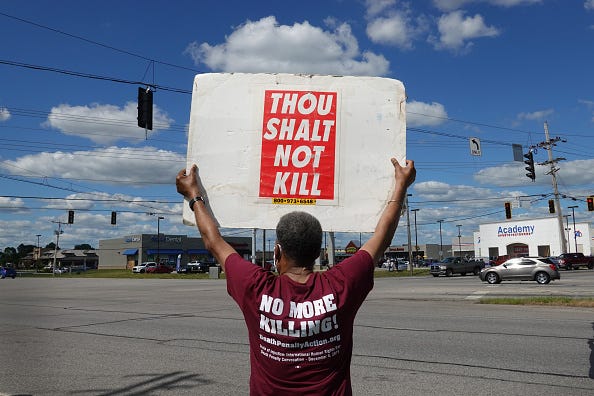
The execution of Marcellus Williams was carried out on Tuesday after the United States Supreme Court rejected a request to delay. Williams was pronounced dead by the state’s Department of Corrections at 6:10 p.m. CT.
Requests to delay came all day on Monday and Tuesday for Williams, who was found guilty in the 1998 stabbing death of Felicia Gayle in a St. Louis suburb. Williams was put to death by lethal injection.
During his time incarcerated and up until last night, Williams maintained his innocence, and the family of Gayle has previously said they opposed his execution.
“We hope this gives finality to a case that has languished for decades,” Missouri Department of Corrections Director Trevor Foley shared on Tuesday evening.
However, St. Louis County Prosecuting Attorney Wesley Bell said the “outcome did not serve the interests of justice.” Bell had previously been fighting to have Williams’ conviction and sentence overturned, citing what he said were discrepancies in the original case.
“There were multiple points in the timeline when decisions could have been made that would have spared him the death penalty,” Bell said in a statement. “If there is even the shadow of a doubt of innocence, the death penalty should never be an option.”
Bell attempted to toss out the case on numerous grounds, including issues with DNA test results and the jury selection process.
In one of his last attempts, Bell spoke before an evidentiary hearing, showing that new test results received the night before again had a discrepancy, indicating that DNA on the murder weapon was consistent with what the first prosecutors found while prosecuting the case, contradicting testing done in the last decade, DeathPenalityInfo.com shared.
The attorney said this showed the knife was handled without gloves and left the evidence contaminated. As a result, Williams and Bell reached an agreement that would see him spend life in prison without the possibility of parole. Gayle’s family signed off on the agreement, but Attorney General Andrew Bailey (R) struck down the plea.
Then, on Monday, the Missouri Supreme Court and Gov. Mike Parson (R-MO) denied final requests to halt the execution.
On Tuesday, those present at the execution were Williams’ son, Marcellus Williams Jr., and two of his attorneys, according to the St. Louis Post Dispatch.
As for the efforts at the nation’s highest court, Supreme Court Justices Sonia Sotomayor, Elena Kagan, and Ketanji Brown Jackson said they would have granted the request to halt the execution.
Attorney Tricia Rojo Bushnell of the Midwest Innocence Project released a statement after the decision from the Supreme Court came down, saying that an “innocent man” was being executed.
“The victim’s family opposes his execution. Jurors who originally sentenced him to death now oppose his execution. The prosecutor’s office that convicted and sentenced him to death has now admitted they were wrong and zealously fought to undo the conviction and save Mr. Williams’ life,” Rojo Bushnell said.
The execution of Williams had several developments in the more than two decades he spent incarcerated.
In 2001, Williams was convicted for the murder of Gayle, a social worker and former reporter at the St. Louis Post-Dispatch. He was sentenced to death by a jury of his peers, with his execution date being set in 2015.
In 2015, the Missouri Supreme Court halted plans to execute Williams, appointing a special master to review DNA testing on the handle of the murder weapon, which was used to stab Gayle 43 times. Police had found it lodged in her neck, CBS News reported
The special master was appointed after attorneys for Williams said DNA experts determined that it was not his on the knife. However, the case was sent back to the state’s supreme court, and a second execution date was set for August 2017.
Hours before his second scheduled execution, then-Gov. Eric Greitens halted it, appointing a panel of five retired judges to investigate the DNA evidence.
But then, in June 2023, Gov. Parson dissolved the panel before a final report was issued.
After this, the evidentiary hearing was held, which included evidence from Bell and testimony from the original trial attorney, Keith Larner. He shared that he had handled the murder weapon improperly and even struck down a juror because he looked like Williams.
While the St. Louis Prosecuting Attorney’s Office told the court that there was “clear and convincing evidence” of several errors made in the case, the judge declined to toss out the conviction and sentence, and the Missouri Supreme Court denied requests to step in.
“Marcellus Williams should be alive today,” Bell said.
